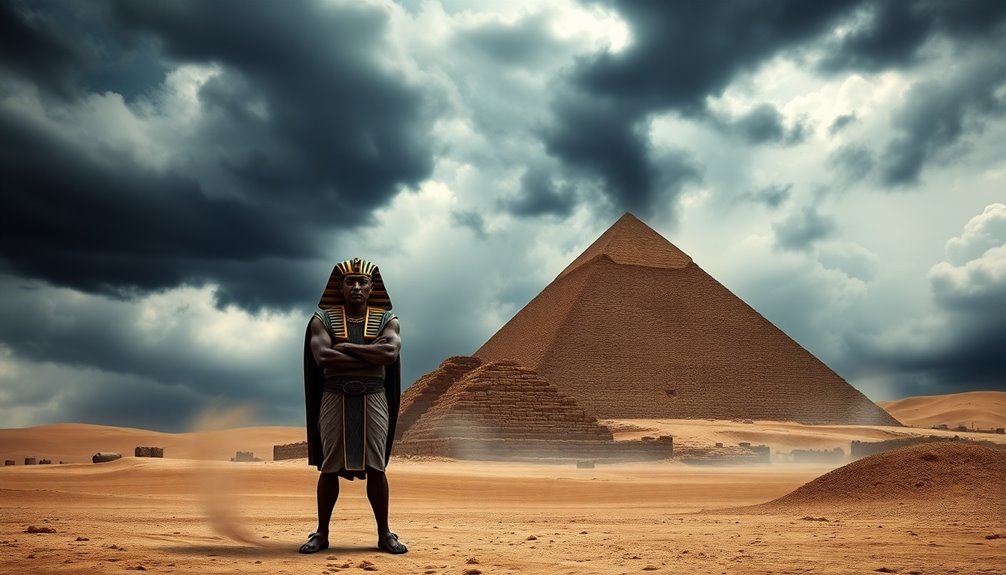God hardened Pharaoh's heart to achieve His purpose of freeing the Israelites from slavery and demonstrating His power over Egypt's false gods. This action highlights the delicate balance between divine sovereignty and human choice, as Pharaoh himself initially chooses to harden his heart. Throughout the plagues, God's hardening emphasizes His authority and serves as a powerful reminder of the consequences of persistent rebellion. Ultimately, Pharaoh's stubbornness leads to catastrophic outcomes, showcasing a cautionary tale about resistance to divine will. If this intrigues you, there's more to discover about the deeper implications of Pharaoh's fate and choices.
Key Takeaways
- God hardened Pharaoh's heart to demonstrate His sovereignty and power over Egypt and its false gods, showcasing divine authority.
- Pharaoh's initial hardening of his own heart reflects human rebellion and resistance against God's will, emphasizing personal accountability.
- The hardening served to fulfill God's plan, as noted in Romans 9:17-18, proclaiming His name and glory through Pharaoh's actions.
- The plagues challenged Pharaoh's authority and the legitimacy of Egyptian gods, illustrating the conflict between divine power and human defiance.
- Pharaoh's stubbornness ultimately led to dire consequences, serving as a cautionary tale about the dangers of resisting divine authority.
Introduction

When you dive into the story of Pharaoh's heart being hardened, you uncover a profound exploration of divine purpose and human resistance. God's action in hardening Pharaoh's heart isn't just a random act; it serves a critical role in the liberation of the Israelites from 400 years of slavery.
Through the series of plagues, God showcases His power and sovereignty, demonstrating that He reigns over Egypt and its false gods. Initially, Pharaoh's refusals highlight his own hard-heartedness, but as the story unfolds, this hardening shifts into a divine judgment, illustrating a complex interplay between human choice and God's will.
Romans 9:17-18 emphasizes that God raised Pharaoh to proclaim His name and glory throughout the earth. This narrative reveals a theological principle: God allows Pharaoh's rebellion to persist, ultimately leading to a dramatic demonstration of His justice and mercy amidst the consequences of sin.
As you reflect on these themes, you'll see how this story reveals not just the fate of Pharaoh, but also the larger purpose behind God's actions, inviting you to ponder the depth of divine sovereignty in human affairs.
Pharaoh's Heart in Exodus

In the Exodus narrative, you'll notice how Pharaoh's heart hardens through both his own decisions and God's actions.
Key references in the Bible capture this complex relationship, showing how Pharaoh's refusal to listen leads to divine intervention.
Primary Bible References
The narrative of Pharaoh's heart in Exodus reveals a profound interplay between divine sovereignty and human choice. In Exodus 7:3-4, God clearly states His plan to harden Pharaoh's heart, aiming to showcase His power through the ten plagues.
Initially, you see Pharaoh hardening his heart after the first few plagues, as illustrated in Exodus 8:15. This self-hardening illustrates human resistance to God's will.
As the plagues progress, the hardening of Pharaoh's heart shifts. By Exodus 9:12, God actively intervenes, hardening Pharaoh's heart, which emphasizes that divine sovereignty takes precedence over human choice.
The culmination of this hardening is evident in Exodus 10:27, where God completely seals Pharaoh's heart against letting the Israelites go.
This sequence serves a dual purpose: it's a fulfillment of God's judgment against Egypt for 400 years of oppression, and it establishes God's reputation among the nations, as noted in Romans 9:17.
Secondary Bible References
How does the theme of Pharaoh's hardened heart resonate in other biblical contexts? The hardening of Pharaoh's heart in Exodus serves as a crucial example of divine sovereignty intertwined with human agency.
Initially, Pharaoh's heart became hard due to his own choices, but as the plagues progressed, God hardened Pharaoh's heart to fulfill His divine plan (Exodus 9:12). This shift highlights how human rebellion against divine commands can lead to dire consequences.
In Romans 9:17, Paul references the hardening of Pharaoh's heart, illustrating that it wasn't just a personal failure; it was part of God's sovereign purpose to showcase His power and glory. By raising Pharaoh for this specific role, God demonstrates His authority over nations and the extent of His control over history.
The narrative emphasizes that while God hardened Pharaoh's heart, it was also a response to Pharaoh's persistent refusal to heed God's commands.
This interplay of divine sovereignty and human agency invites you to reflect on the broader implications of your own choices in relation to divine will.
Egyptian Beliefs About Divine Will

Egyptian beliefs about divine will revolved around a complex pantheon of gods, each responsible for different aspects of life and nature. Pharaohs, viewed as divine figures, acted as intermediaries between these gods and the people. Their decisions were believed to reflect divine will, reinforcing their authority and importance in maintaining cosmic order.
You'd notice that rituals and offerings were integral to appeasing the gods, as Egyptians believed their favor was crucial for prosperity, health, and protection.
Central to these beliefs was the concept of Ma'at, symbolizing truth and cosmic order. The Pharaoh's role was vital in upholding this order, making any resistance of his heart to divine commands significant.
When plagues struck Egypt, they weren't merely natural disasters; they represented direct challenges to the authority of Pharaoh and the Egyptian gods. These events illustrated the supremacy of the Hebrew God over Egypt's entrenched beliefs.
Thus, understanding Egyptian divine will helps you grasp why Pharaoh's hardened heart held such profound implications. It wasn't just a matter of personal defiance but a struggle between competing notions of divine authority and power.
Divine Sovereignty and Human Free Will

Understanding the dynamics of divine sovereignty and human free will reveals the intricate dance between God's authority and Pharaoh's choices during the Exodus narrative. The hardening of Pharaoh's heart serves as a pivotal example of how divine sovereignty operates alongside human free will. Initially, Pharaoh hardens his own heart in response to the plagues, showcasing his rebellion against God.
However, as the narrative progresses, God actively hardens Pharaoh's heart, demonstrating His authority over the situation. This interplay emphasizes that while God has a divine plan, He still respects Pharaoh's ongoing choices. Romans 9:17-18 highlights that God raised Pharaoh for a specific purpose, intertwining divine sovereignty with Pharaoh's ability to reject the demands placed upon him.
Ultimately, this complex relationship reinforces the notion of accountability; Pharaoh's persistent defiance leads to his downfall. The tension between divine sovereignty and human free will illustrates that while God orchestrates events for His righteous purposes, individuals remain responsible for their actions.
Thus, the narrative serves as a reminder that choices have consequences, demonstrating the profound impact of human decision-making within the framework of divine authority.
Pharaoh's Free Will Debate

When discussing Pharaoh's free will, it's essential to debunk the misconceptions that suggest he'd no agency in his choices.
You'll see how his initial decisions set the stage for God's hardening, raising questions about the balance between free will and divine control.
This debate challenges you to consider how both elements interact in the unfolding narrative.
Debunk Misconceptions About Free Will
The debate around Pharaoh's free will often leads to confusion, especially when considering the biblical narrative of his hardened heart.
Many assume that when God hardened Pharaoh's heart, it negated his ability to make choices. However, this interpretation overlooks crucial details. Initially, Pharaoh's heart became hard of his own accord, showing that he'd the capacity to resist God's will.
While God's hardening of Pharaoh's heart played a significant role, it's essential to understand that it served a divine purpose.
It wasn't merely about control; God aimed to demonstrate His power and glory through Pharaoh's persistent rebellion. This hardening didn't strip Pharaoh of his free will; instead, it responded to Pharaoh's continuous refusal to heed warnings and change his course.
Free Will vs. Divine Control
The tension between free will and divine control is vividly illustrated in Pharaoh's story, raising thought-provoking questions about human agency. You see, while God hardens Pharaoh's heart, the initial hardening stems from Pharaoh's own choices. This complex interplay highlights the paradox of free will against divine sovereignty.
Biblical texts show that Pharaoh hardens his own heart first, suggesting his repeated defiance paves the way for God's intervention. Romans 9:17-18 emphasizes that God hardens Pharaoh's heart to showcase His power and glory. This complicates your understanding of free will within divine plans.
Traditional interpretations suggest that Pharaoh's free will allows him to make choices leading to his eventual hardening. Despite divine influence, he remains accountable for his actions. Pharaoh's narrative serves as a cautionary tale about the consequences of persistent rebellion against divine authority.
When you reject grace repeatedly, you risk losing it, leading to a hardened heart. Ultimately, this serves a greater purpose—fulfilling God's redemptive plans for the Israelites. In recognizing both free will and divine control, you can appreciate the intricate balance between human agency and divine sovereignty in the unfolding of biblical events.
Individual Heart Transformation Insights

As you reflect on your own stubbornness, consider how your choices shape your heart over time.
It's crucial to recognize that your decisions can either soften or harden your spirit, just like Pharaoh's.
In a community context, think about how collective attitudes can influence everyone's capacity for compassion and obedience. Furthermore, embracing an attitude of self-acceptance can significantly contribute to a more compassionate collective environment.
Self-Reflection on Stubbornness
While you may not always recognize it, stubbornness can quietly creep into your heart, leading you away from growth and understanding. Just like Pharaoh, your repeated refusals to embrace change can result in a heart that's hardened against truth.
Each time you choose pride over humility, you create a momentum that distances you from compassion and connection with others and God.
Self-awareness is crucial in this journey. Take a moment to reflect on your choices and ask yourself: Am I resisting what I know is right? This kind of honest introspection can illuminate the areas where stubbornness has taken root.
When you acknowledge these tendencies, you open the door to heart transformation.
The story of Pharaoh serves as a cautionary tale, reminding you of the consequences of letting self-interest override compassion. If you find yourself in a cycle of defiance, remember that change requires an openness to grace.
Don't let your heart become so hardened that you can't see the beauty in vulnerability and growth. Embrace the process of transformation, and allow compassion to guide your choices, breaking free from the chains of stubbornness.
Community Reflection on Stubbornness
Reflect on how stubbornness can seep into not just individual hearts but also communities, creating barriers to collective growth and understanding.
Just like Pharaoh's heart, which became increasingly hard-hearted through defiance, communities can fall into a similar trap. When members refuse to acknowledge the truth or remain closed off to change, they perpetuate a cycle of stubbornness that hinders progress.
Each act of resistance—whether against new ideas or constructive criticism—creates a ripple effect, leading to moral decay and disconnection.
Pharaoh's story serves as a stark reminder that hard-heartedness can reach a point of no return, making personal transformation nearly impossible. It emphasizes the necessity of humility and openness in fostering an environment of growth.
Pharaoh's Ultimate Fate Examined

Pharaoh's ultimate fate serves as a stark warning about the dangers of stubbornness in the face of divine authority. Despite multiple chances to heed God's commands and let the Israelites go, Pharaoh's heart was hard. His refusal to submit led to catastrophic consequences, culminating in the death of the firstborns, which marked a pivotal moment in the Exodus narrative. God hardened Pharaoh's heart, allowing him to showcase his defiance, but ultimately sealing his doom.
As the Israelites escaped, Pharaoh's obstinacy didn't relent. He pursued them, demonstrating how deeply entrenched his pride was. This choice aligned with God's sovereign plan, as it provided a stage for divine justice.
When Pharaoh and his army were drowned in the Red Sea, it was more than a military defeat; it was a powerful testament to God's authority.
Pharaoh's ultimate fate serves as a cautionary tale. His hardened heart not only led to his destruction but also illustrated the dire consequences of resisting divine will. In the end, Pharaoh's legacy remains a symbol of the cost of defiance against God and the triumph of His purpose.
Additional Resources

Understanding the complexities surrounding Pharaoh's hardened heart can be enriched by exploring additional resources that delve into the theological implications of this narrative.
You'll find that many materials discuss how God hardened Pharaoh's heart to demonstrate His sovereignty and power through the plagues, ultimately leading to the liberation of the Israelites.
BibleProject offers insightful educational content, examining the intricate relationship between divine judgment and mercy. They highlight that Pharaoh's heart was hard not just due to God's actions but also because of Pharaoh's own choices.
This interplay provides a deeper understanding of how God's hardening of Pharaoh's heart serves a purposeful role within the Exodus narrative.
Scholarly discussions often emphasize that this wasn't an arbitrary act; instead, it was a deliberate step to fulfill God's divine plan in response to centuries of oppression against the Israelites.
You can explore various theological commentaries and articles that further dissect these themes, enriching your grasp on the complexities of Pharaoh's heart.
Engaging with these resources will deepen your understanding of how human free will interacts with divine intervention, making the story of Pharaoh's heart all the more compelling.
Frequently Asked Questions
Why Does God Harden the Heart of Pharaoh?
When you consider why God hardens Pharaoh's heart, think about the interplay between divine purpose and human choice.
God's hardening isn't just about control; it's a response to Pharaoh's own stubbornness. As Pharaoh repeatedly rejects God's commands, his heart becomes increasingly resistant.
This process reveals how your choices can lead to your downfall while fulfilling a greater plan. Ultimately, it highlights the seriousness of rebellion against divine authority and justice.
What Does Hardening of the Heart Mean in the Bible?
In the Bible, hardening of the heart means developing a stubborn resistance to God's guidance.
It shows how persistent sin can lead you away from divine wisdom, resulting in destructive choices. When you refuse to listen or repent, your heart becomes increasingly unyielding.
This state not only affects your relationship with God but can also have dire consequences in your life.
Ultimately, it underscores the importance of humility and openness to divine will.
Why Did the Pharaoh Change His Mind?
Pharaoh changed his mind due to his pride and desire for control.
Each time a plague struck, he'd promise to let the Israelites go, only to retract his promise once the immediate threat passed.
His heart hardened as he faced the consequences of his defiance.
You can see how relief from suffering led him to reconsider, but ultimately, his arrogance and stubbornness kept him from truly submitting to authority.
Did God Harden Pharaoh's Heart Before the Plagues?
Yes, God did harden Pharaoh's heart before the plagues began.
Initially, Pharaoh's stubbornness led him to resist Moses and Aaron's requests.
As the plagues progressed, the narrative shows a shift where God actively hardened Pharaoh's heart, especially during the plagues of boils and darkness.
This divine action emphasized the power of God's will in contrast to Pharaoh's choices, illustrating a complex relationship between human decisions and divine intervention.










